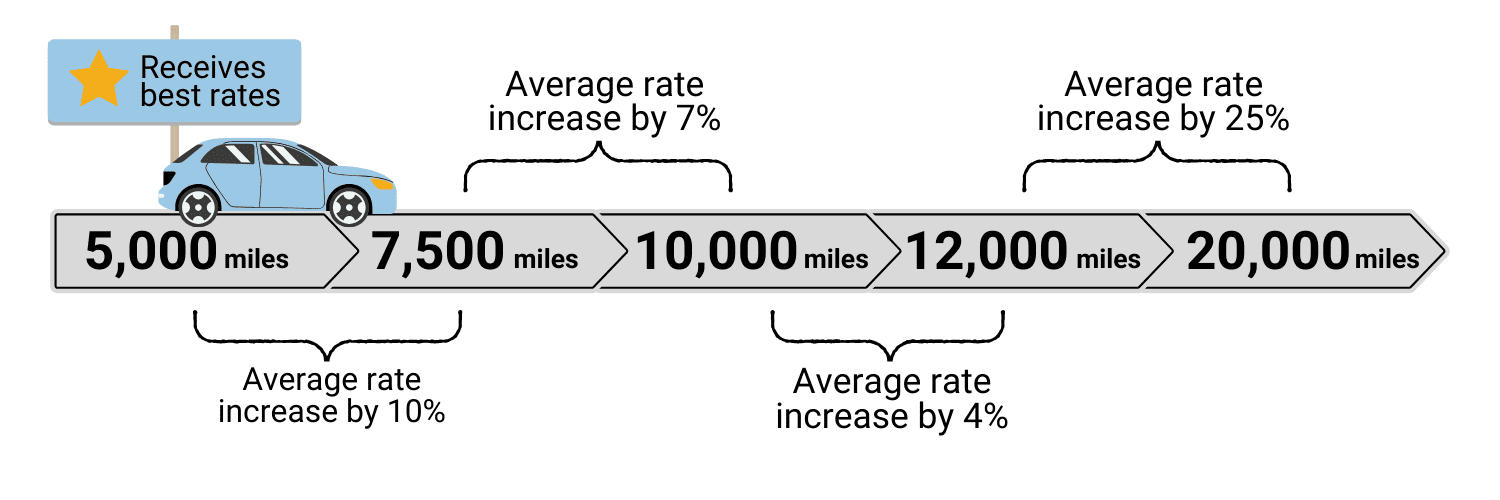Does Mileage Affect Car Insurance Rates? Find Out Now
Yes, mileage does affect car insurance. Insurers consider mileage when determining premiums.
Higher mileage can lead to higher rates. Driving more increases the risk of accidents. Insurers see high mileage as higher risk. This means more miles can result in higher insurance costs. On the other hand, low mileage might lower your premiums.
Insurance companies use mileage to estimate how much you drive. This helps them understand the risk they are taking. So, how much you drive impacts what you pay. Understanding this can help you manage your insurance costs better. Let’s explore how mileage affects your car insurance in detail.
Mileage And Insurance Basics
Mileage is the number of miles a car has been driven. It shows how much the car has been used. High mileage means the car has traveled a lot. Low mileage means the car has not been driven much. Insurance companies check your car’s mileage. They use it to decide your rates.
Insurance rates depend on many factors. One important factor is mileage. Cars that are driven more often are at a higher risk for accidents. So, higher mileage can lead to higher insurance costs. Other factors include your driving history and the type of car you drive. Your location also affects rates. Insurance companies look at how often you use your car. They also consider where you drive it. This helps them decide your premium.
Correlation Between Mileage And Risk
Driving more means higher risk. More time on the road leads to more chances of accidents. Car insurance companies see this and may charge you more. High mileage can also wear out your car faster. This can lead to more repairs. Higher repairs mean your car is less safe.
Driving less can save you money on insurance. Fewer miles mean fewer risks. Insurance companies may offer lower rates for low mileage drivers. Your car stays in better shape with fewer miles. This means fewer repairs and a safer car. Lower risk means lower insurance costs.
Mileage Categories
Low mileage drivers use their cars less. They drive under 7,500 miles a year. These drivers may get lower insurance rates. Insurance companies see them as less risky. Less driving means fewer chances for accidents. Low mileage can help save money on insurance.
High mileage drivers use their cars more. They drive over 15,000 miles a year. Insurance companies see them as more risky. More driving means more chances for accidents. High mileage often leads to higher insurance rates. Driving a lot can cost more in insurance.

Credit: clark.com
Insurance Discounts For Low Mileage
Low mileage can mean fewer accidents. So, some insurers give discounts. To qualify, you need to drive less than 7,500 miles yearly. You may need to show proof of your mileage. This can be done using maintenance records or tracking devices.
Call your insurance company. Ask about low mileage discounts. Fill out any forms they give you. Send your mileage records to them. Wait for their response. If you meet the criteria, they will lower your rates. It’s that simple.
Telematics And Mileage Tracking
Mileage affects car insurance rates significantly. Telematics and mileage tracking help insurers determine the risk level based on driving habits. Lower mileage often leads to reduced premiums.
What Is Telematics?
Telematics uses technology to track your car’s movements. It collects data on your driving habits. This includes speed, braking, and mileage. Insurers use this data to set your insurance rates. Driving safely can lower your costs. Telematics devices are usually installed in your car. Some systems use your smartphone for tracking. Data is sent to your insurance company. They can then analyze it for better rate calculations.
Benefits Of Telematics
Telematics offers several benefits. It helps you save on insurance. Safe drivers get rewards with lower premiums. It also promotes safer driving habits. You become more aware of your driving. This can lead to fewer accidents. Families can track their teen drivers. It provides peace of mind for parents. Lastly, telematics can help locate stolen cars. The GPS feature makes recovery easier. Overall, telematics improves driving and safety.

Credit: www.compare.com
Insurance Companies And Mileage Policies
Different insurers have different rules. Some companies give discounts for low mileage. Others do not care as much. State Farm, Geico, and Allstate are big names. They often have different plans for different drivers. Mileage plays a big role in their offers.
| Insurance Company | Mileage Discount Policy |
|---|---|
| State Farm | Offers discounts for driving less than 7,500 miles per year. |
| Geico | Provides a lower rate for drivers with low annual mileage. |
| Allstate | Has special plans for low-mileage drivers. |
Tips To Reduce Insurance Costs
Mileage can impact car insurance costs. Lower mileage often means lower risk, leading to potential discounts on premiums. Regularly updating your insurer on annual mileage can save money.
Driving Less
Driving fewer miles can lower your car insurance. Insurers see less driving as less risk. Try carpooling or public transport. This can save money and reduce wear on your car. You might get a discount for low mileage. Check your policy details. Speak with your insurer about this option.
Choosing The Right Policy
Selecting the right policy is crucial. Compare different insurance plans. Look for the best rate for your needs. Some plans offer special discounts. These can be for safe driving or low mileage. Review your policy every year. Make sure it still fits your needs.

Credit: www.bankrate.com
Frequently Asked Questions
Does High Mileage Increase Car Insurance?
Yes, high mileage can increase car insurance premiums. Insurers view high mileage as a higher risk because more driving means more potential for accidents.
How Does Low Mileage Affect Car Insurance?
Low mileage can lead to lower insurance premiums. Insurers may offer discounts for cars driven less frequently, as they pose a lower risk.
Is Mileage A Factor In Car Insurance Rates?
Yes, mileage is a significant factor in determining car insurance rates. Insurers use mileage to assess risk and set premiums.
Can I Get A Discount For Low Mileage?
Yes, many insurers offer discounts for low mileage. Fewer miles driven typically mean lower risk, resulting in potential savings.
Conclusion
Mileage does affect car insurance rates. Lower mileage can mean lower premiums. Insurers consider lower mileage less risky. Regularly updating your mileage helps. Be honest about your driving habits. Use public transport or carpool to reduce mileage. Understanding these factors can save you money.
Always compare insurance quotes. Choose the best option for your needs. Drive safely and maintain your car well.







